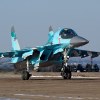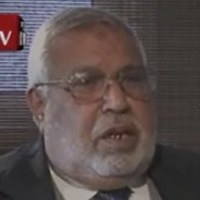![]()
Thu, Oct 20, 2011 | Rubin Reports | By Barry Rubin
What Gaddafi’s Death Teaches the Middle East…And Should Teach the West
What can we learn from the death of Libyan dictator Moammar Qadhafi? First, we should note that he is the second Arab dictator to die in the last decade, the first being the Iraqi Saddam Hussein. Both met their demise due to direct Western intervention.
There are three lessons for the region:
1. To get rid of a dictator, you need either Western intervention or the support of the armed forces.
Consider this simple list:
- Dictatorships overthrown with Western forces taking the lead: Iraq, Libya
- Dictatorships overthrown with the backing of the army: Egypt, Tunisia
- Failed revolutions when these two factors are lacking: Algeria, Bahrain, Iran, Saudi Arabia, Syria, Yemen
That shows that it is not popular revolt that changes things in the region.
Dictators must fight or die and concessions don’t help.
The Western view is that revolutions are prevented by moderation and compromise, steps that please the masses and thus discourage them from revolting. This is so deeply ingrained that Western observers simply cannot conceive that approach as anything but a natural law. In contrast, in the Middle East, the political philosophy has been based on the idea that force and intimidation prevail.
With one notable exception, where brilliant maneuvering and concessions (albeit often illusory ones) worked — Morocco — the Middle East has shown that its approach works locally. Even in Turkey, where democratic norms are observed, once in power the Islamist regime has gained ground through toughness and not through concessions. The prisons are full of its opponents.
The event in Eastern Europe that most impressed Arab governments was the assassination in Romania of dictator Nicolae Ceauşescu and his wife, Elena. They knew that this could happen to them. When combined with the lesson from the USSR — how Mikhail Gorbachev’s engagement in reforms brought him down — these events played a central role in destroying the 1990s era of toying with possible moderation. The “old-time religion” of toughness and repression was reaffirmed.
Nowhere has this proven to be truer than in Syria. Despite Western fantasies of moderation and reform from dictator Bashar al-Assad, there has never been the slightest chance of this happening. The whole Obama foreign policy toward Syria was demonstrably foolish.
2. The events of the last year have reinforced this worldview — repress or die. Have no illusions.
An interesting case study of how this works is offered by Aymenn Jawad al-Tamimi in a superb short article, “Assessing Bahrain.” The strength of al-Tamimi’s analysis is that he points out both the real threat (Iranian-backed, radical Islamist Shia opposition) and the tragedy (the regime’s failure to deal with a more moderate Shia faction that wants a constitutional monarchy and isn’t Islamist).
But would it have been possible to work with the latter without ending up having the hardliners triumph? Impossible to say for sure, of course, but the hardline ruling faction in the monarchy wasn’t interested in finding out, and the Saudis certainly didn’t want to take any chances. Hence, they turned to pure repression and are still in power.
3. (Ironically) You can’t trust the West, so be tough and defend yourself.
Remember a peculiar fact: even though Gaddafi was generally a horribly repressive anti-American dictator, in his final years he tried making a deal with the Americans. Gaddafi was frightened by the U.S. attack on Iraq in 2003 and didn’t want to be next on the list. So he cooperated, gave up his nuclear and other weapons of mass destruction programs, and reduced his foreign subversive efforts.
That did not save him from being overthrown by the United States, just as it did not save a genuine American ally, President Hosni Mubarak in Egypt. On this point, I’m not advocating anything about what the United States should have done in Libya but just observing how it will be received in the region.
Bashing the West in the current era brings little cost. Here’s a partial list:
Egypt: Obama courts Muslim Brotherhood and is indifferent to anti-Americanism of the newly empowered political forces
Gaza Strip: Terrorist Hamas gets Western support to stay in power, including bashing of Israel’s military operation and pressure on Israel to minimize sanctions.
Lebanon: No opposition to Syria-Iran sponsored forces and Hizballah; readiness to deal with the government they now control; no enforcement of 2006 UN resolution to stop arms smuggling and Hizballah’s return to the south. Incidentally, on the same day Gaddafi dies the first Hizballah delegation is officially received in Moscow.
Palestinian Authority: Refuses negotiations with Israel; refuses compromise; ignores U.S. requests but gets rewarded by the whole world while its enemy Israel is reviled.
Syria: Courted by the Obama administration; protected at the UN by a Russia-China veto, facing only very limited pressure despite massive repression.
Turkey: No punishment for regime’s sabotage of 2003 U.S. invasion of Iraq, sabotage of sanctions on Iran, alliance with radical Islamist forces. In fact, Obama administration rewards.
In contrast, allies — Bahrain, Mubarak’s Egypt, Israel, Saudi Arabia, and the moderate oppositions in Iran, Lebanon, and Turkey — are not helped or are even punished by the West and especially the U.S. government.
Thus, the region will note that when Gaddafi was a leading sponsor of terrorism, subversion, and anti-Americanism, he got away with it. When he was on “good terms” with the United States, he lost power. That might not be fair, but it seems to make sense in terms of Middle Eastern political philosophy.
Remember the wisdom of Joseph Heller’s great novel Catch-22 on that point:
Major Danby replied indulgently with a superior smile: “But, Yossarian, suppose everyone felt that way.”
“Then,” said Yossarian, “I’d certainly be a damned fool to feel any other way, wouldn’t I?”
Unrelated fun fact:
We all know — or at least are constantly told — that representations of Muhammad, founder of Islam, are forbidden in Islam. People have been targeted for death for drawing cartoons including his face.
Some brave souls have provided examples of Islamic art where he is pictured. Here’s another one: In Amsterdam’s Tropenmuseum is a nice Iranian tapestry of a century ago, used by pious storytellers to tell about Shia Islam. There in one panel is the founding family: Muhammad, his daughter Fatima, his son-in-law Ali, and their children Hussein and Hassan. Muhammad is portrayed as a guy with a black beard; Fatima’s face is whited out with a veil.
This isn’t the only case where foolish Westerners have been sold a bill of goods about what Islam “requires.” Another example that Islamists, ignorant academics, deceptive Muslim writers, and journalistic apologists don’t know what they are talking about. Islam, say the radicals and much of the mainstream, is whatever we say so shut up and do what we say.
Sort of the way the Middle East works, too.



 RSS
RSS











What Gaddafi’s Death Teaches the Middle East…And Should Teach the West | Middle East, Israel, Arab W http://t.co/j2fMDF1U
What Gaddafi’s Death Teaches the Middle East…And Should Teach the West | Middle East, Israel, Arab W http://t.co/j2fMDF1U
Hi, I am iranian living in exile and there was no revolution in Iran niether on 1979 nor on 2009. On 1979 we just had political change and not real revolution if USA and europ didn’t support khomeyni we would have real revolution. you have no idea about revolution. what do you mean by revolution? you mean colour revolution backed by west or east? no real revolution will be called revolution with the suport of its army (Egypt) or arm groups. revolution means changes on political, economical, social, cultural change in former regime like on going fight in Greece.